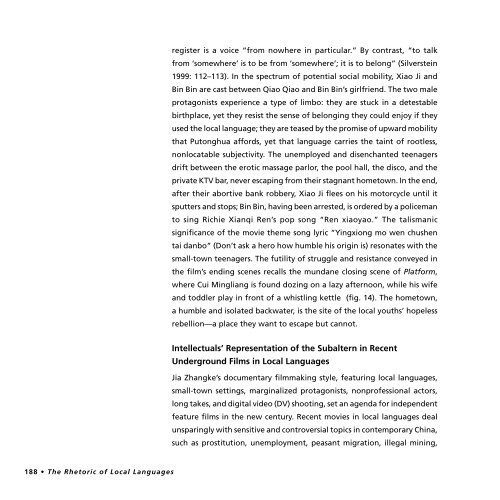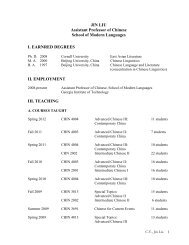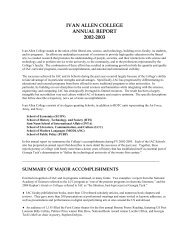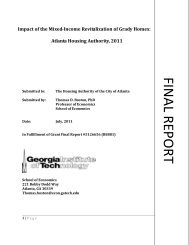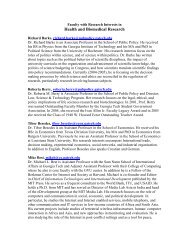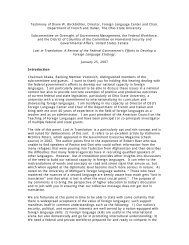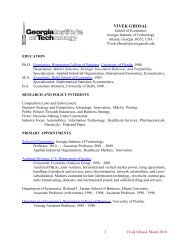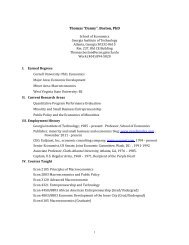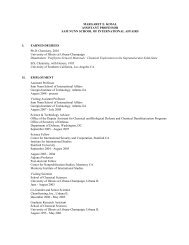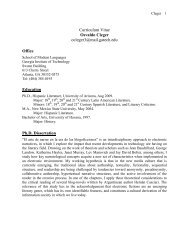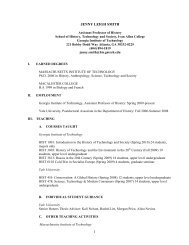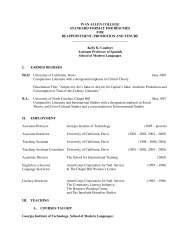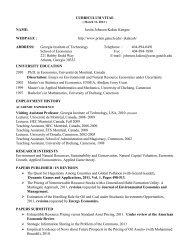Read this paper
Read this paper
Read this paper
You also want an ePaper? Increase the reach of your titles
YUMPU automatically turns print PDFs into web optimized ePapers that Google loves.
egister is a voice “from nowhere in particular.” By contrast, “to talk<br />
from ‘somewhere’ is to be from ‘somewhere’; it is to belong” (Silverstein<br />
1999: 112–113). In the spectrum of potential social mobility, Xiao Ji and<br />
Bin Bin are cast between Qiao Qiao and Bin Bin’s girlfriend. The two male<br />
protagonists experience a type of limbo: they are stuck in a detestable<br />
birthplace, yet they resist the sense of belonging they could enjoy if they<br />
used the local language; they are teased by the promise of upward mobility<br />
that Putonghua affords, yet that language carries the taint of rootless,<br />
nonlocatable subjectivity. The unemployed and disenchanted teenagers<br />
drift between the erotic massage parlor, the pool hall, the disco, and the<br />
private KTV bar, never escaping from their stagnant hometown. In the end,<br />
after their abortive bank robbery, Xiao Ji flees on his motorcycle until it<br />
sputters and stops; Bin Bin, having been arrested, is ordered by a policeman<br />
to sing Richie Xianqi Ren’s pop song “Ren xiaoyao.” The talismanic<br />
significance of the movie theme song lyric “Yingxiong mo wen chushen<br />
tai danbo” (Don’t ask a hero how humble his origin is) resonates with the<br />
small-town teenagers. The futility of struggle and resistance conveyed in<br />
the film’s ending scenes recalls the mundane closing scene of Platform,<br />
where Cui Mingliang is found dozing on a lazy afternoon, while his wife<br />
and toddler play in front of a whistling kettle (fig. 14). The hometown,<br />
a humble and isolated backwater, is the site of the local youths’ hopeless<br />
rebellion—a place they want to escape but cannot.<br />
Intellectuals’ Representation of the Subaltern in Recent<br />
Underground Films in Local Languages<br />
Jia Zhangke’s documentary filmmaking style, featuring local languages,<br />
small-town settings, marginalized protagonists, nonprofessional actors,<br />
long takes, and digital video (DV) shooting, set an agenda for independent<br />
feature films in the new century. Recent movies in local languages deal<br />
unsparingly with sensitive and controversial topics in contemporary China,<br />
such as prostitution, unemployment, peasant migration, illegal mining,<br />
188 • The Rhetoric of Local Languages<br />
MCLC 18.2.indd 188<br />
12/20/06 2:01:39 PM


